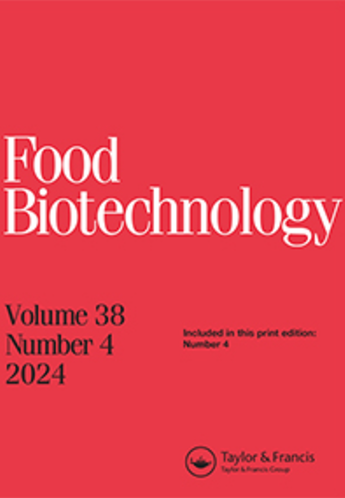天然成分作为嫩化肉类和肉制品的可持续替代品:最新综述
IF 1.6
4区 农林科学
Q4 BIOTECHNOLOGY & APPLIED MICROBIOLOGY
引用次数: 1
摘要
嫩度是最理想的肉质之一,也是消费者偏好的重要决定因素。评估/实现最佳压痛并不简单,因为它们容易受到复杂因素的影响。培养肉类最佳嫩度的努力被称为肉类嫩化,可分为物理、化学和生物方法。虽然物理嫩化涉及机械地破坏肌肉肌原纤维/结缔组织,但化学技术应用化学/合成添加剂。相反,最可持续的生物学方法使用天然产物(主要是蛋白酶)来培养肉的嫩度。这项研究对植物、动物和微生物的天然产品进行了最新的综述,这些产品已被用作肉类嫩化剂。我们详细讨论了不同天然嫩化剂来源的比较优势和劣势,并提出了一些总体因素,这些因素限制了自然嫩化剂相对于合成化学品的广泛接受。最后,提出了实现天然产品作为嫩化肉类的全球选择的前景。本文章由计算机程序翻译,如有差异,请以英文原文为准。
Nature-derived ingredients as sustainable alternatives for tenderizing meat and meat products: an updated review
ABSTRACT Tenderness is one of the most desirable meat qualities and a significant determinant of consumers’ preference. Estimating/achieving optimal tenderness are not straightforward because of their susceptibility to complex factors. Efforts toward fostering optimal tenderness in meat are called meat tenderization and can be categorized under physical, chemical, and biological approaches. While physical tenderization involves mechanically breaking the muscle myofibrillar/connective tissues, chemical techniques apply chemical/synthetic additives. Conversely, the most sustainable biological approaches use natural products (mainly proteases) to foster meat tenderness. This study presents an updated review of natural products from plants, animals, and microbes that have gained applicability as meat tenderizers. We have discussed in detail the comparative advantages and disadvantages of the different natural sources of tenderizers and presented some overarching factors that limit the widespread acceptance of natural tenderizers over synthetic chemicals. Finally, prospects for achieving natural products as a more global choice for tenderizing meat were suggested.
求助全文
通过发布文献求助,成功后即可免费获取论文全文。
去求助
来源期刊

Food Biotechnology
工程技术-生物工程与应用微生物
CiteScore
3.80
自引率
0.00%
发文量
15
审稿时长
>12 weeks
期刊介绍:
Food Biotechnology is an international, peer-reviewed journal that is focused on current and emerging developments and applications of modern genetics, enzymatic, metabolic and systems-based biochemical processes in food and food-related biological systems. The goal is to help produce and improve foods, food ingredients, and functional foods at the processing stage and beyond agricultural production.
Other areas of strong interest are microbial and fermentation-based metabolic processing to improve foods, food microbiomes for health, metabolic basis for food ingredients with health benefits, molecular and metabolic approaches to functional foods, and biochemical processes for food waste remediation. In addition, articles addressing the topics of modern molecular, metabolic and biochemical approaches to improving food safety and quality are also published.
Researchers in agriculture, food science and nutrition, including food and biotechnology consultants around the world will benefit from the research published in Food Biotechnology. The published research and reviews can be utilized to further educational and research programs and may also be applied to food quality and value added processing challenges, which are continuously evolving and expanding based upon the peer reviewed research conducted and published in the journal.
 求助内容:
求助内容: 应助结果提醒方式:
应助结果提醒方式:


